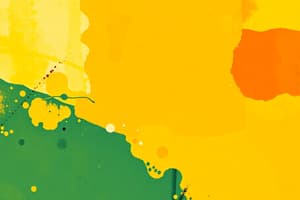Podcast
Questions and Answers
What is the primary characteristic of nonfiction writing?
What is the primary characteristic of nonfiction writing?
- It presents information, facts, and reality-based content (correct)
- It is based on fictional events
- It is always written in the first person
- It is used to entertain the reader
Which type of nonfiction writing focuses on the author's life experiences?
Which type of nonfiction writing focuses on the author's life experiences?
- Autobiography
- Biography
- Essay
- Memoir (correct)
What is the main difference between a biography and an autobiography?
What is the main difference between a biography and an autobiography?
- Who writes the text (correct)
- The style of the writing
- The tone of the writing
- The length of the text
Which of the following is NOT a key feature of nonfiction writing?
Which of the following is NOT a key feature of nonfiction writing?
What is the primary purpose of nonfiction writing?
What is the primary purpose of nonfiction writing?
Who is the target audience for nonfiction writing?
Who is the target audience for nonfiction writing?
Which type of nonfiction writing communicates scientific information and research to a general audience?
Which type of nonfiction writing communicates scientific information and research to a general audience?
What is the tone and style of nonfiction writing dependent on?
What is the tone and style of nonfiction writing dependent on?
Flashcards are hidden until you start studying
Study Notes
Definition and Characteristics
- Nonfiction is a genre of writing that presents information, facts, and reality-based content
- It is based on verifiable evidence, research, and observation
- Nonfiction texts can be informative, educational, or persuasive in nature
Types of Nonfiction
- Memoir: a personal narrative that focuses on the author's life experiences
- Biography: a detailed account of a person's life, written by someone else
- Autobiography: a self-written account of one's life
- Essay: a short, analytical piece of writing that explores a specific topic or issue
- Informative article: a factual piece of writing that provides information on a particular topic
- Self-help: a book or text that offers advice and guidance on personal development or improvement
- History: a written account of past events, people, or periods
- Science writing: a genre that communicates scientific information and research to a general audience
- Travel writing: a genre that describes a person's travel experiences and observations
Key Features
- Objectivity: nonfiction aims to present facts and information without bias or personal opinion
- Accuracy: nonfiction texts rely on verifiable evidence and research to support their claims
- Clarity: nonfiction writing should be clear, concise, and easy to understand
- Organization: nonfiction texts often follow a logical structure, such as chronological or cause-and-effect
Purpose and Audience
- Informative purpose: nonfiction aims to educate, inform, or persuade the reader
- Target audience: nonfiction can be written for general audiences, specialists, or specific groups (e.g., academics, professionals)
- Tone and style: nonfiction writing can vary in tone and style, depending on the purpose and audience
Definition and Characteristics
- Nonfiction writing presents information, facts, and reality-based content, relying on verifiable evidence, research, and observation.
- It can be informative, educational, or persuasive in nature.
Types of Nonfiction
- Memoir: a personal narrative that focuses on the author's life experiences, often written in a first-person perspective.
- Biography: a detailed account of a person's life, written by someone else, often featuring in-depth research and interviews.
- Autobiography: a self-written account of one's life, offering a personal and introspective perspective.
- Essay: a short, analytical piece of writing that explores a specific topic or issue, often featuring the author's perspective and opinions.
- Informative article: a factual piece of writing that provides information on a particular topic, often featuring objective data and research.
- Self-help: a book or text that offers advice and guidance on personal development or improvement, often featuring practical strategies and techniques.
- History: a written account of past events, people, or periods, often featuring in-depth research and analysis.
- Science writing: a genre that communicates scientific information and research to a general audience, often featuring technical data and explanations.
- Travel writing: a genre that describes a person's travel experiences and observations, often featuring descriptive language and cultural insights.
Key Features
- Objectivity: nonfiction writing aims to present facts and information without bias or personal opinion, relying on verifiable evidence and research.
- Accuracy: nonfiction texts rely on verifiable evidence and research to support their claims, ensuring that the information is reliable and trustworthy.
- Clarity: nonfiction writing should be clear, concise, and easy to understand, avoiding technical jargon and complex terminology.
- Organization: nonfiction texts often follow a logical structure, such as chronological or cause-and-effect, to facilitate understanding and comprehension.
Purpose and Audience
- Informative purpose: nonfiction aims to educate, inform, or persuade the reader, often featuring a clear and concise presentation of information.
- Target audience: nonfiction can be written for general audiences, specialists, or specific groups (e.g., academics, professionals), tailoring the content and tone to meet the audience's needs and expectations.
- Tone and style: nonfiction writing can vary in tone and style, depending on the purpose and audience, ranging from formal and objective to informal and conversational.
Studying That Suits You
Use AI to generate personalized quizzes and flashcards to suit your learning preferences.




